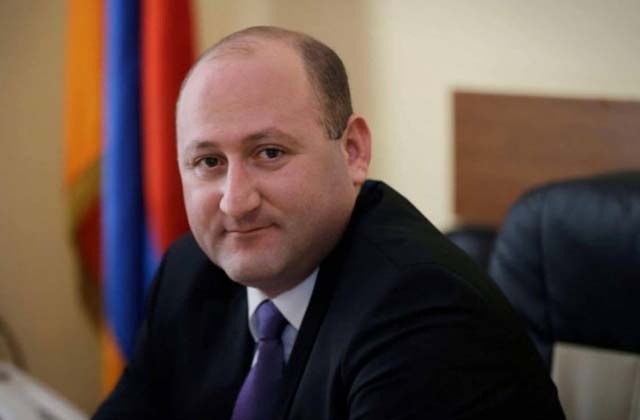“Reflection of newly appointed US Secretary of State to Karabakh was a clear message for Aliyev”

Interview with Suren Sargsyan, Teaching Assistant, Fletcher School of Law and Diplomacy, Tufts University.
Mr. Sargsyan, prior to US president-elect Donald Trump’s inauguration there were hopes that he won’t implement his pre-election plan, by which rather radical reforms were anticipated in both external and internal life of the US. Trump’s first decisions and appointments have already raised noise in the USA, Europe and the world. How do you assess work of first days of Trump’s administration?
On the whole, Donald Trump started to implement what he promised toward external and internal political directions. His resolution on migrants is noteworthy, which is also a component of pre-election plan. The president-elect started working rather actively in all other directions as well. Foreign policy relations with Russia are important, he always supported settlement of those relations.
Regarding support to Israel also, as a candidate, as a president, he has already stated and he’s working in that direction, he appointed professionals in personnel policy, although US newly appointed Secretary of State Tillerson isn’t a diplomat, Secretary of Defense Mattis, members of the Supreme Court are professionals. In general, he started to implement greater part of his pre-election promises, and I’m sure, he’s working on the other part.
How will USA-Europe, USA-Russia relations develop on account of the point that Trump is implementing his pre-election plan, in which settlement of relations with Russia had its peculiar place, then Trump-Putin telephone conversation, then the tension in Ukraine’s east—Donbass?
If we mean the circumstance of how Trump solves his relations with Russia, it’s becoming obvious, that Trump should go to concessions in some directions. We saw tension in Donbass right after their telephone conversation, aggressive actions were observed, this may be linked to this telephone conversation, as it lasted for 1.5 hour and the presidents supposedly discussed all the issues, I’m sure there were discussions around sanctions as well, if they agreed to meet after it, it means positive signals, tendencies are observed in Russia-USA relations.
We should also note that currently the only competitor of the US in the world is China, as upon some calculations the first, and upon some—the second economy in the world is that of China after the USA, i.e. only China may be a real contestant to the USA. How can the USA deprive China of that role? It should attempt to somehow restrain Chinese economic growth, and it may be implemented in a few directions.
The first direction is that the US unilaterally left the Transatlantic cooperation agreement, and it’s a serious platform for China’s trade and economic relations. We also realize that the USA can’t confront both with China and Russia, thus, it’s obliged to make any of them its partner. Of course, supposedly it’ll be Russia, as the latter isn’t included in the top ten, i.e. the USA doesn’t observe Russia as its contestant, neither a political and economic power causing concern, thus, it’ll attempt to introduce passiveness in China’s economic growth at least on account of settlement of relations with Russia.
On account of the positive dynamics you mentioned in Russia-USA relations, whom it was favorable to sharpen the situation in Donbass? There is an opinion that this needs Kiev to attach the attention of the USA, and according to other opinions, by this Moscow sent signals to Washington. What do you think of this?
Generally, if we follow world information flow, we’ll notice it’s been a long time Ukraine’s topic isn’t in top five or ten. Naturally, this sharpening might bring Ukraine’s topic to the center of world information flow, making it primary. However, it’s difficult to say which side needs this step. As we stated both sides should gain certain benefits, Ukraine could remind of existence of its issues, Russians could perceive this as a signal, however, I don’t think that Russians could condition their activities with signal received from the USA, as they have always been negative, but here activities have been recorded, thus, I don’t consider this to be a Russian initiative.
Prior to Trump’s inauguration many experts anticipated that the office will keep distance from Russia’s neighbors and our regions, including NK conflict. These days Secretary of State Rex Tillerson stated that he’ll work with the governments of Armenia and Azerbaijan to find peaceful, long-term settlement, which will provide stability and prosperity in the region. In his words, NK unsettled conflict is a threat to US national interests. What does this statement suppose in this new policy context?
First, it’s worth understanding that this statement is the first statement of the new administration referring to Armenia, our region and Nagorno Karabakh. I consider, it wasn’t only a clear message to Azerbaijani authorities, that the US keeps that political line it had adopted, but also introduces itself a bit more aggressive, stating that the conflict doesn’t generate from US national security interests only. This is an additional signal to Aliyev, who recently became a Saddam Hussein and doesn’t take the opinion of the international community into consideration, he attempts to play independently, make independent decisions, undertake military operations not only with NK on the contact line, but also along Armenia-Azerbaijan border.
USA isn’t the state to have passive engagement in some directions, it’s a leading power gifted with all the properties of a superpower, and it’s clear that everywhere it’ll have representation and move forward its interests. It’ll continue to actively engage with the Minsk Group process. Let’s not forget that MG is the only format, where the three states have shared ideas, there is no tense situation, thus, this format is rather productive, and I don’t consider that anyone’s role or importance may considerably recede. Let’s not forget, when even certain activities are initiated by the US and Russian presidents between presidents of Armenia and Azerbaijan, the Co-Chairs work in coordination.
Appointment of former US Ambassador to Armenia John Heffern in Nuland’s post received rather positive reflection. What does this mean to Armenia? How the Armenian side may use ties with Heffern and his knowledge on the region in Armenia-USA and geopolitical relations?
Let me clarify that he temporarily assumes the post, Nuland left with his administration, and it isn’t yet clear whether Tillerson will appoint him in the post or no. However, he has imagination on the region, he was a good Ambassador, however, it doesn’t mean we should anticipate more, than he can do for us.
These days US Ambassador to Armenia Richard Mills appeared with his annual speech, who within his priorities singled out productivity of Armenian government in some fields, criticizing works in fight against corruption. What do you think, Is the USA changing its rhetoric in Yerevan and should this be observed in the context of pre-election developments?
You know, that fight against corruption has permanently been in the center of both US and Armenian governments, I don’t observe new tendencies here. On the whole, it’s worth attaching attention to the messages coming from the USA.
By Araks Martirosyan

























